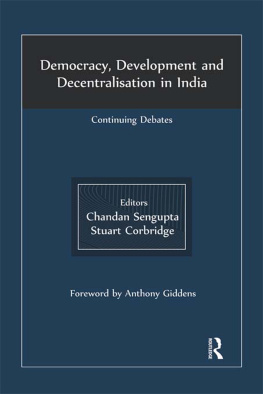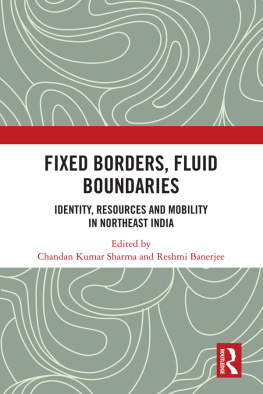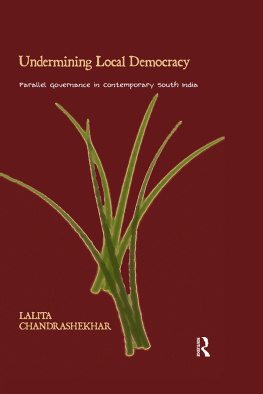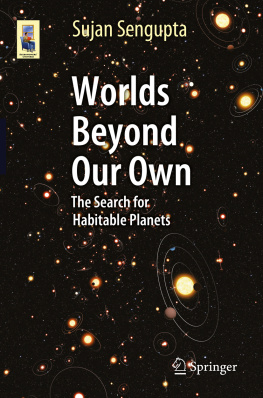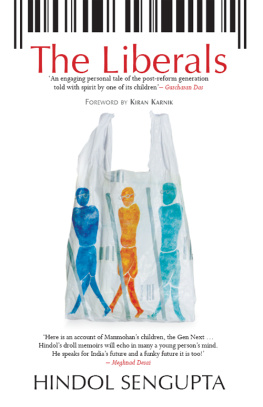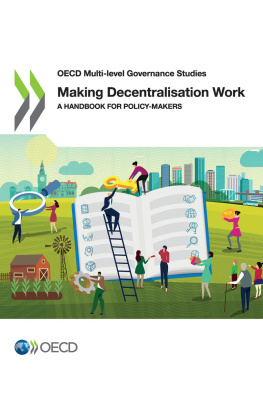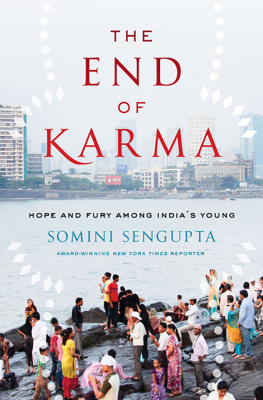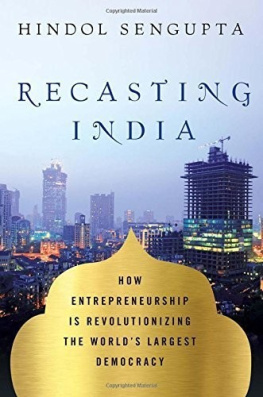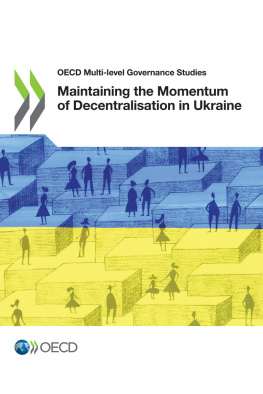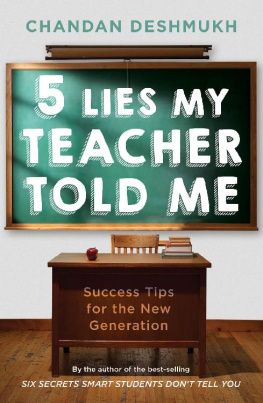Democracy, Development and
Decentralisation in India
Democracy, Development and
Decentralisation in India
Continuing Debates
Editors
Chandan Sengupta
Stuart Corbridge
Foreword by Anthony Giddens
First published 2010
by Routledge
912 Tolstoy House, 1517 Tolstoy Marg, New Delhi 110 001
Simultaneously published in the UK
by Routledge
2 Park Square, Milton Park, Abingdon, Oxon, OX14 4RN
Routledge is an imprint of the Taylor & Francis Group, an informa business
Transferred to Digital Printing 2010
2010 Chandan Sengupta and Stuart Corbridge
Typeset by
Star Compugraphics Private Limited
D156, Second Floor
Sector 7, Noida 201 301
All rights reserved. No part of this book may be reproduced or utilised in any form or by any electronic, mechanical or other means, now known or hereafter invented, including photocopying and recording, or in any information storage and retrieval system without permission in writing from the publishers.
British Library Cataloguing-in-Publication Data
A catalogue record of this book is available from the British Library
ISBN: 978-0-415-56317-8
Contents
List of Tables
List of Figures
List of Abbreviations
| AP | Andhra Pradesh |
| BBC | British Broadcasting Corporation |
| BJP | Bharatiya Janata Party |
| CDR | Credit-deposit Ratio |
| CMIE | Centre for Monitoring Indian Economy |
| CPI(M) | Communist Party of India (Marxist) |
| DESTIN | Development Studies Institute |
| GDP | Gross Domestic Product |
| GOI | Government of India |
| IGIDR | Indira Gandhi Institute of Development Research |
| JFR | Justice As Fairness |
| KRRS | Karnataka Rajya Rayta Sangha (Karnataka State Farmers Association) |
| MKSS | Mazdoor Kisan Shakti Sanghatan |
| NGO | Non-governmental organization |
| NSSO | National Sample Survey Organisation |
| OAE | Own Account Enterprises |
| OBC | Other Backward Classes |
| OSR | Own Source of Revenue |
| RBA | Rights-based Approach |
| RBI | Reserve Bank India |
| RNFE | Rural Non-farm Employment |
| RNFS | Rural Non-farm Sector |
| RSK | Rayta Samparka Kendra (farmer contact centre) |
| RTI | Right to Information |
| SC | Scheduled Caste |
| SCB | Scheduled Commercial Bank |
| ST | Scheduled Tribe |
| TISS | Tata Institute of Social Sciences |
| TJ | A Theory of Justice |
| ULBS | Urban Local Bodies |
| US | United States |
Acknowledgements
T his volume is the product of an ongoing academic collaboration between the Tata Institute of Social Sciences (TISS) and the London School of Economics (LSE) under the sponsorship of the J. N. Tata Trust, Mumbai. The articles in the volume were first presented in a joint workshop organised by the Development Studies Institute, LSE and the Centre for Development Studies, TISS in London in June 2007. We wish to express our gratitude to the J. N. Tata Trust for their generous grant and unstinting support to the LSETISS collaboration that gave us the opportunity to bring out this volume. We are also very much thankful to all the participants in the workshop and the authors for their important contributions in the book. We owe much to R. K. Krishna Kumar, Chairman of the Governing Board and to S. Parasuraman, Director, TISS for their constant encouragement and unfailing support in our work. Several TISS and LSE colleagues wholeheartedly supported the book project and helped organise the workshop. In particular, we wish to thank Ruth Kattumuri, Co-Director, LSE's India Observatory for her excellent cooperation and facilitation throughout our work on the book. We are also grateful to Scott Shurtleff of LSE's Asia Research Centre for helping us organise initial editing work for the manuscripts and to Anji Mehta for the copy-editing work. Finally, we express our gratitude to the Editorial Department, Routledge, Delhi, for the valuable suggestions on the title and structure of the book, painstaking editorial attention to details and help in its production.
Foreword
Anthony Giddens
W e often speak of societies in terms of whether they are democratic or not, but as every student of the concept will affirm, democracy is a complex notion. Some of the most authoritarian states in the world label themselves democracies, on the grounds that they have representational procedures of some kind or another. They may even see themselves as more democratic than societies usually regarded as being the most developed democracies. The Soviet Union and the Soviet-type societies in Eastern Europe prior to 1989 were self-proclaimed people's democracies. The system of soviets was supposed to represent the will of the people as a whole. Bourgeois democracy, as Marx argued, was a flawed system, producing governments concerned with sectional interests rather than all citizens.
Yet it is bourgeois democracy that is today regarded as the pre-eminent form, and with good reason. A one-party state cannot be democratic precisely because it does not permit the expression of different interests and the activities of interest groups; and because it does not allow for the replacement of unpopular leaders through electoral procedures. Elections and a multiparty system are therefore integral to democracy. To work effectively, elections must be free and fair in other words, administered in an impartial way, without intimidation and with above-board voter registration.
These conditions in turn require others. They imply the rule of law and an impartial judiciary, to guarantee that open procedures are followed. Just as importantly, they imply freedom of speech, because electoral contests are not only contests of personnel, but in greater or lesser degree, ideas. One shouldn't either underestimate the importance of a civil service that remains non-partisan, and is able to adjust readily to changes of government. It is also the case that a well-functioning democracy presumes widespread acceptance that citizens belong to a common community of fate a shared identity of some sort that overrides cultural differences, no matter how profound some of these may be.
Finally, representative democracy is not the only form democratic involvement can or should take. Various types of direct democracy can exist alongside or in conjunction with it. Thus referenda can complement orthodox democratic procedures. Various kinds of groups in civil society can play a part in the functioning of democracy, since they contribute to public debate and to ensuring that issues that should be on the public agenda are in fact there. Indeed, a healthy and diverse civil society can arguably be added to the above list as a precondition of an effectively democratic society.
The contributors to this excellent volume are well aware of the complex nature of democracy and explore many aspects of it. The book is a remarkable contribution to the already very extensive literature that exists on democracy in an Indian context. It contains some notable theoretical contributions but balances these with a rich variety of empirical material, on a national as well as a local level.

